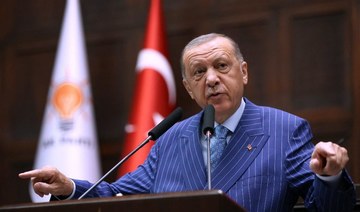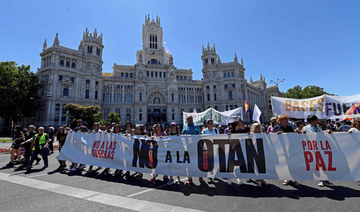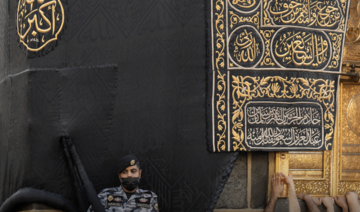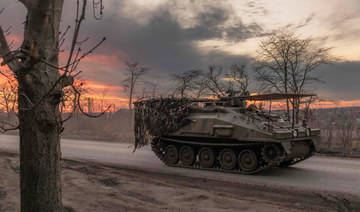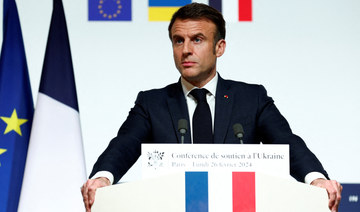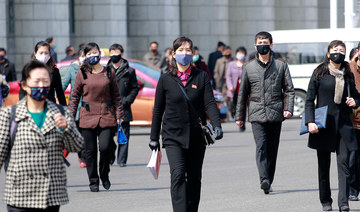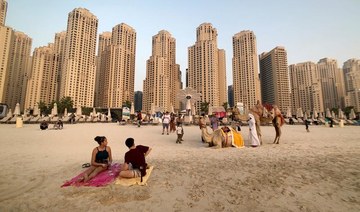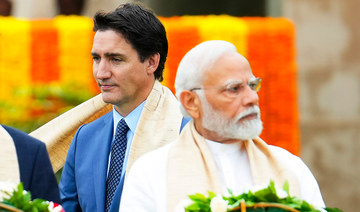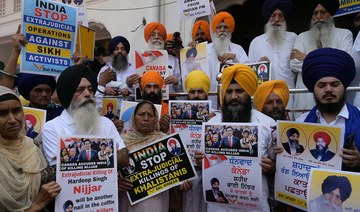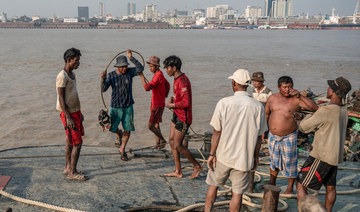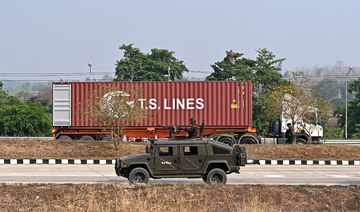MADRID: Russia’s invasion of Ukraine has sparked a “fundamental shift” in NATO’s approach to defense, and member states will have to boost their military spending in an increasingly unstable world, the leader of the alliance said Tuesday.
Secretary-General Jens Stoltenberg spoke as US President Joe Biden and other NATO leaders began to arrive in Madrid for a summit that will set the course of the alliance for the coming years. He said the meeting would chart a blueprint for the alliance “in a more dangerous and unpredictable world.”
“To be able to defend in a more dangerous world we have to invest more in our defense,” Stoltenberg said. Just nine of NATO’s 30 members meet the organization’s target of spending 2 percent of gross domestic product on defense.
Top of the agenda for leaders in meetings Wednesday and Thursday is strengthening defenses against Russia and supporting Ukraine.
Moscow’s invasion on Feb. 24 shattered European security and brought shelling of cities and bloody ground battles back to the continent. NATO, which had begun to turn its focus to terrorism and other non-state threats, has had to confront an adversarial Russia once again.
“Ukraine now faces a brutality which we haven’t seen in Europe since the Second World War,” Stoltenberg said.
Russia’s invasion has also prompted Sweden and Finland to abandon their long-held nonaligned status and apply to join NATO. But they are being blocked by Turkish President Recep Tayyip Erdogan, who has insisted that he will only allow the Nordic pair to enter if they change their stance on Kurdish rebel groups that Turkey considers terrorists.
Stoltenberg said “we hope to make progress” on the issue in Madrid.
Diplomats and leaders from the three countries have held a flurry of talks in an attempt to break the impasse. The three countries’ leaders are due to meet in Madrid alongside Stoltenberg on Tuesday.
Swedish Foreign Minister Ann Linde told the Svenska Dagbladet newspaper that negotiations with Turkey had “progressed” and that “something positive” might happen in Madrid, but “it can also take longer.”
The Turkish leader showed no sign of backing down.
“We don’t want empty words. We want results,” Erdogan said Tuesday before leaving Ankara for Spain.
Jamie Shea, a former senior NATO official who is an associate at the Chatham House think tank, said the Madrid meeting, with national leaders present in the media glare, “is the moment of maximum pressure” for compromise.
“It’s either at Madrid or it’s likely to go on for a long while,” he said.
Ending the deadlock over Sweden and Finland would allow NATO leaders to focus on their key issue: an increasingly unpredictable and aggressive Russia.
A Russian missile strike Monday on a shopping mall in the central Ukrainian city of Kremenchuk was a grim reminder of the war’s horrors. Some saw the timing, as Group of Seven leaders met in Germany and just ahead of NATO, as a message from Moscow.
Ukrainian President Volodymyr Zelensky, who is due to address NATO leaders by video on Wednesday, called the strike on the mall a “terrorist” act.
Stoltenberg said Monday that NATO allies will agree at the summit to increase the strength of the alliance’s rapid reaction force nearly eightfold, from 40,000 to 300,000 troops. The troops will be based in their home nations, but dedicated to specific countries on NATO’s eastern flank, where the alliance plans to build up stocks of equipment and ammunition.
Beneath the surface, there are tensions within NATO over how the war will end and what, if any, concessions Ukraine should make to end the fighting.
There are also differences on how hard a line to take on China in NATO’s new Strategic Concept — its once-a-decade set of priorities and goals. The last document, published in 2010, didn’t mention China at all.
The new concept is expected to set out NATO’s approach to the growing economic and military reach of China, and the rising importance and power of the Indo-Pacific region. For the first time, the leaders of Japan, Australia, South Korea and New Zealand are attending the summit as guests.
Some European members are wary of the tough US line on Beijing and don’t want China cast as an opponent alongside Russia.
Stoltenberg said last week that “we don’t regard China as an adversary,” but added that it “poses some challenges to our values, to our interests, to our security.”
NATO summit to open as leader warns of ‘dangerous’ world
https://arab.news/vk3t9
NATO summit to open as leader warns of ‘dangerous’ world
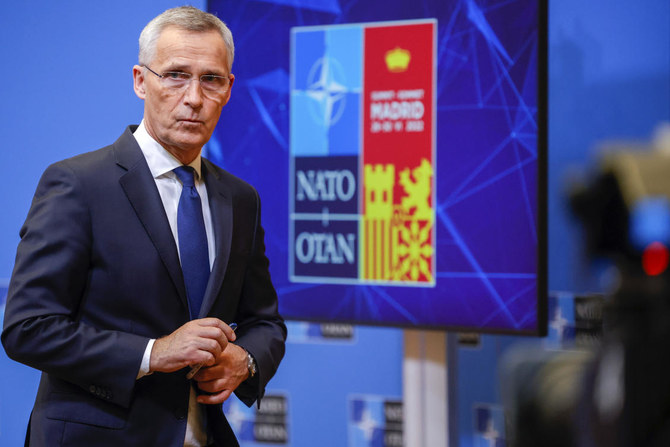
- ‘To be able to defend in a more dangerous world we have to invest more in our defense’
- Top of the agenda for leaders in meetings is strengthening defenses against Russia and supporting Ukraine
First Bangladeshi pilgrims ready to depart for Hajj
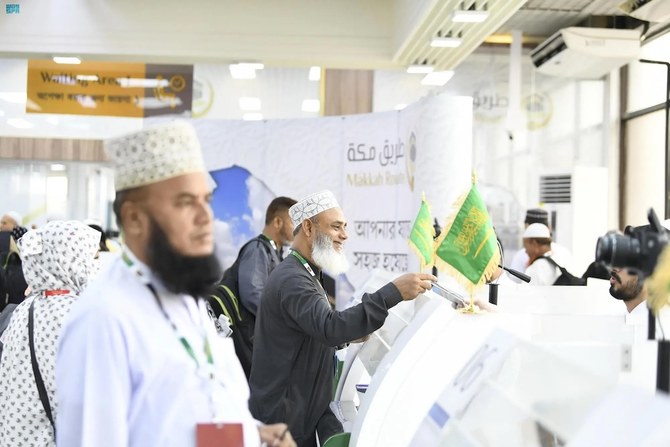
- The country’s quota this year is 127,000 pilgrims
- First flight leaves for Saudi Arabia on Thursday
DHAKA: Thousands of Bangladeshis are going to become some of the earliest Hajj pilgrims to arrive in Saudi Arabia this year, with the first batch scheduled to fly to Jeddah on Thursday.
This year, the Hajj is expected to start on June 14 and end on June 19.
While the pilgrimage itself can be performed over five or six days, pilgrims often arrive early, knowing that it may be a once-in-a-lifetime opportunity to fulfill their religious duty.
The first Hajj flight carrying 419 pilgrims is scheduled to leave for Jeddah from Hazrat Shahjalal International Airport in Dhaka on Thursday morning.
“Our pilgrims will be the first batch of Hajj pilgrims from around the world who will arrive in the Kingdom,” Mohammad Matiul Islam, additional secretary at the Ministry of Religious Affairs, told Arab News.
“Some pilgrims opt to travel earlier to the holy land, as it gives them spiritual peace. It’s the pilgrims’ choice to determine their time of travel.”
This year, Saudi Arabia granted Bangladesh a quota of 127,000 pilgrims to perform the spiritual journey that is one of the five pillars of Islam. Because of the rising cost of airfares to the Middle East, fewer Bangladeshis than expected will be able to go.
Bangladesh, one of the most populous Muslim-majority countries, also struggled to meet the quota in 2023, when the minimum government rate for Hajj was $6,000.
To prevent the same scenario during the 2024 pilgrimage season, the Bangladeshi government reduced the cost by $1,000, but high inflation at home prevented a third of prospective pilgrims from registering.
“As we fell short of meeting the number, a quota of 41,000 is surrendered to Saudi Arabia,” Islam said. “The surrendering of this (remaining slots) will not affect the receiving of our Hajj quota next year.”
Saudi visa registration for Bangladeshis will end on Saturday, and most of them will be departing over the next few weeks from Dhaka, where they will be assisted by Saudi authorities under the flagship Makkah Route initiative.
The pre-travel program was launched by the Kingdom in 2019 to help pilgrims to meet all the visa, customs and health requirements at their airport of origin, and save them long hours of waiting before and upon arrival in Saudi Arabia.
From Wednesday, those flying in the next few days can wait for departure at a special Hajj camp near the airport in Dhaka.
“While staying at the Hajj camp, the pilgrims have their Bangladeshi immigration part done. Also, a part of Saudi immigration is being done here as the pilgrims leave their luggage here to Makkah Route authorities,” Islam said.
“The air-conditioned accommodation here is free of cost for the pilgrims ... We suggest the pilgrims from outside Dhaka be at the Hajj camp two days before their flight. The camp can hold more than 5,000 pilgrims at a time.”
Russia warns French troops legitimate targets if they are sent to Ukraine
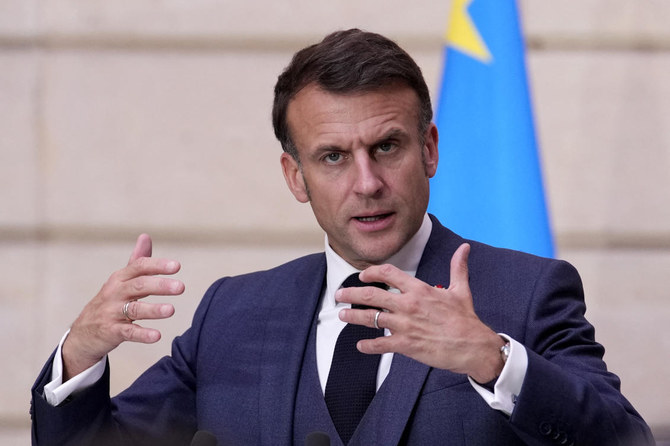
- French president Emmanuel Macron caused controversy in February by saying he could not rule out the deployment of ground troops in Ukraine in the future
MOSCOW: Russia warned France on Wednesday that if President Emmanuel Macron sent troops to Ukraine then they would be seen as legitimate targets by the Russian military.
Macron caused controversy in February by saying he could not rule out the deployment of ground troops in Ukraine in the future. The French leader warned that if Russia wins in Ukraine then Europe’s credibility will be reduced to zero.
“It is characteristic that Macron himself explains this rhetoric with the desire to create some kind of ‘strategic uncertainty’ for Russia,” Russian Foreign Ministry Spokeswoman Maria Zakharova told reporters.
“We have to disappoint him — for us the situation looks more than certain,” Zakharova said.
“If the French appear in the conflict zone, they will inevitably become targets for the Russian armed forces. It seems to me that Paris already has proof of this.”
Zakharova said Russia was already seeing growing numbers of French nationals among those killed in Ukraine.
Russia said on Monday it would practice the deployment of tactical nuclear weapons as part of a military exercise after what the Moscow said were threats from France, Britain and the United States.
AstraZeneca says withdraws Covid vaccine ‘for commercial reasons’

LONDON: British drugmaker AstraZeneca said Wednesday that it has withdrawn its Covid vaccine Vaxzevria, one of the first produced in the pandemic, citing “commercial reasons” and a surplus of updated jabs.
“As multiple, variant Covid-19 vaccines have since been developed there is a surplus of available updated vaccines. This has led to a decline in demand for Vaxzevria, which is no longer being manufactured or supplied,” an AstraZeneca spokeperson said.
3 Indian men charged with killing Sikh separatist leader in Canada appear in court
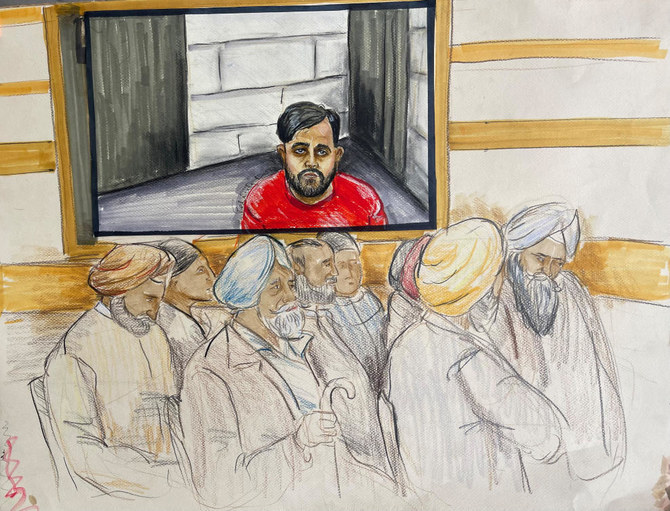
SURREY, British Columbia: Three Indian men charged with killing Sikh separatist leader Hardeep Singh Nijjar in British Columbia last year have appeared in court in the case that set off a diplomatic spat after Canadian Prime Minister Justin Trudeau said there were “credible allegations” of Indian involvement.
Canadian police had arrested the three Indian men last week in Edmonton, Alberta, and they have been charged with first-degree murder and conspiracy to commit murder.
Canadian Mounted Police Superintendent Mandeep Mooker said Friday that the investigation into whether the men had ties to India’s government was ongoing.
Nijjar, 45, was shot to death in his pickup truck last June after he left the Sikh temple he led in the city of Surrey. An Indian-born citizen of Canada, he owned a plumbing business and was a leader in what remains of a once-strong movement to create an independent Sikh homeland. India designated him a terrorist in 2020 and at the time of his death had been seeking his arrest for alleged involvement in an attack on a Hindu priest.
India has denied involvement in the slaying. In response to the allegations, India told Canada last year to remove 41 of its 62 diplomats in the country. Tensions remain but have somewhat eased since.
The arrested men — Kamalpreet Singh, 22, Karan Brar, 22, and Karanpreet Singh, 28 — appeared in court Tuesday via a video link and agreed to a trial in English. They were ordered to appear in British Columbia Provincial Court again on May 21.
Brar and Karanpreet Singh appeared in the morning. Kamalpreet’s appearance was delayed until the afternoon as he waited to speak to a lawyer.
The small provincial courtroom was filled with spectators during the morning session. Others crowded into an overflow room to watch the proceedings via video.
Richard Fowler, the defense lawyer representing Brar, said the case will eventually be moved to the Supreme Court and combined into one case.
About 100 people gathered outside the courthouse waving yellow flags and holding photos of Indian government officials whom they accuse of being involved in Nijjar’s killing.
Canadian police say the three suspects had been living in Canada as non-permanent residents.
A bloody decadelong Sikh insurgency shook north India in the 1970s and 1980s until it was crushed in a government crackdown in which thousands of people were killed, including prominent Sikh leaders.
The Khalistan homeland movement has lost much of its political power but still has supporters in the Indian state of Punjab, as well as in the sizable overseas Sikh diaspora. While the active insurgency ended years ago, the Indian government has repeatedly warned that Sikh separatists were trying to make a comeback.
UN: Myanmar displaced now at 3 million
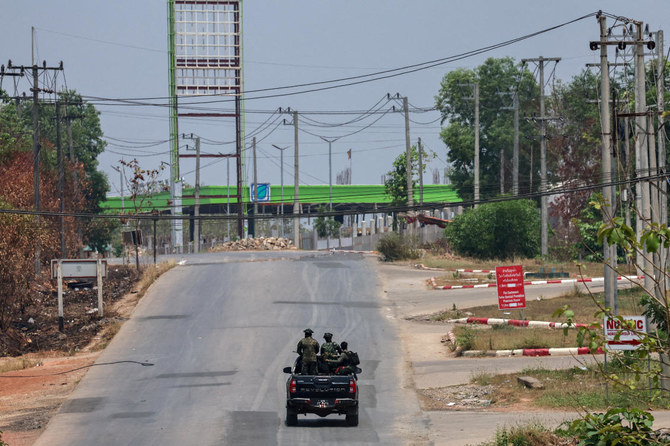
- An estimated one-third of those displaced are children, according to the UN statement
YANGON: The number of displaced people in Myanmar has reached three million, the United Nations said, the vast majority forced to flee their homes by conflict unleashed by the military’s 2021 coup.
Around 2.7 million have fled since the putsch that toppled Aung San Suu Kyi’s government after a short-lived experiment with democracy.
The coup sparked renewed clashes with established ethnic armed groups and birthed dozens of new “People’s Defense Forces” that the military has failed to crush.
“Myanmar stands at the precipice in 2024 with a deepening humanitarian crisis,” the UN’s resident coordinator in the country said in a statement released on Monday.
An estimated one-third of those displaced are children, according to the statement.
Around half of the three million have been displaced since late last year, when an alliance of ethnic armed groups launched an offensive across northern Shan state, the statement said.
The offensive seized swathes of territory and lucrative trade crossings on the China border, posing the biggest threat to the junta since it seized power.
Myanmar’s borderlands are home to a plethora of ethnic armed groups, many of whom have battled the military since independence from Britain in 1948 over autonomy and control of lucrative resources.
The UN said a severe funding shortfall was hampering its relief efforts, particularly ahead of the May-June cyclone season.
Last year cyclone Mocha smashed into western Myanmar’s Rakhine state, killing at least 148 people.
More than 355,000 people are currently displaced in western Rakhine state, which has been rocked since November by clashes between the Arakan Army and the military, the UN said.



